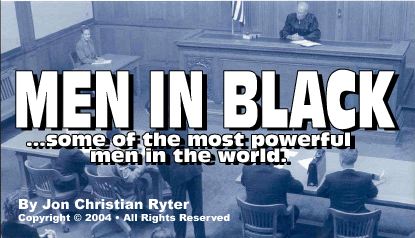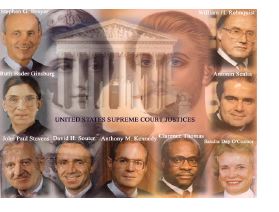
News
Behind the Headlines
Two-Cents Worth
Video of the Week
News Blurbs
Articles
Testimony
Bible Questions
Internet Articles (2015)
Internet Articles (2014)
Internet
Articles (2013)
Internet Articles (2012)
Internet Articles (2011)
Internet Articles (2010)
Internet Articles
(2009)
Internet Articles (2008)
Internet Articles (2007)
Internet Articles (2006)
Internet Articles (2005)
Internet Articles (2004)
Internet Articles (2003)
Internet Articles (2002)
Internet Articles (2001)


 e
correctly think of the invisible money barons who own the Federal Reserve
and the central banks of all the nations of the world as the most powerful
men in the world. And they are. With the spoken word, a nod and a handshake,
binding contracts for millions if not billions of dollars are cast in
iron. With their approval, men who might otherwise live in relative obscurity
become governors and presidents. Without their approval, presidents tremble
and kingdoms fall. They are the true titans of the world. They are virtually
omnipotent from a humanistic sense--and they are completely invisible.
From on-high they govern those who govern. They are the masters of the
universe who are shaping the Earth into global hegemony of subservient
nation-states that will shortly become a universal, multi-continental
nation governed for, and by, the elites of the world.
e
correctly think of the invisible money barons who own the Federal Reserve
and the central banks of all the nations of the world as the most powerful
men in the world. And they are. With the spoken word, a nod and a handshake,
binding contracts for millions if not billions of dollars are cast in
iron. With their approval, men who might otherwise live in relative obscurity
become governors and presidents. Without their approval, presidents tremble
and kingdoms fall. They are the true titans of the world. They are virtually
omnipotent from a humanistic sense--and they are completely invisible.
From on-high they govern those who govern. They are the masters of the
universe who are shaping the Earth into global hegemony of subservient
nation-states that will shortly become a universal, multi-continental
nation governed for, and by, the elites of the world.
Below them on the ladder of power are the presidents, prime ministers and beaucratic minions--those we commonly view as the most powerful men and women in the world. They are the lawmakers and the bureaucratic administrators of social justice in the developed world.
The geopolitical policies they implement determine the direction of nations and whether peace or war envelopes the globe. In the sphere we observe with our eyes and other senses, these two groups are the most powerful men and women in the world. Or are they?
In the United States of America, the politicians are legally obligated to observe the protective protocol of the Bill of Rights when they enact the laws by which we are governed. However, the men in black who "judge" the merits of the laws of the land have assumed for themselves the right to ignore, or mitigate the Bill of Rights in their decisions by coupling unrelated laws together in order to either "veto" existing case law or create new laws that allow the men in black to promulgate an unpopular social agenda that could never be successfully legislated by the lawmakers. Three recent examples of judicial abuse are found in [1] the Dec.2, 2003 ruling of the U.S. Supreme Court that allows police officers to violate the 4th Amendment with "no knock" searches. In that decision, the high court ruled in U.S. v Banks that the police, if they believe a suspect will destroy the evidence against them if they have a chance, do not have to wait before breaking down the door.
Dah? Excuse me?
What police officer would think otherwise?
All those in favor of waiting for the suspect to ditch the evidence against him before they let the police in, raise their hand. Everyone else, break down the door.
On July 28, 1998 North Las Vegas police raided the home of LaShawn Lowell Banks with a search warrant. They knocked, and even before someone 20 feet from the door could possibly have opened it, they crashed the door in. When they got inside, Banks had just stepped out of his shower, dripping wet, to answer the door. The masked police officers took Banks, naked and dripping wet, handcuffed into the kitchen for interrogation. They found crack cocaine.
Banks was arrested, tried, convicted and sent to prison. He appealed to the 9th Circuit. The appellate court ruled that the 4th Amendment mandated that officers wait a reasonable period after knocking before breaking down the door.
The 9th Circuit Court threw out the conviction on the grounds that the evidence against Banks was secured only through the violation of his 4th Amendment rights. I hate drug dealers, and I hate drugs. And, generally I have nothing but contempt for the decisions coming from the 9th Circuit Court of Appeals.
But, this time, I agree with them. You can't abrogate the Bill of Rights when it is convenient to catch the bad guys and expect those abuses not to happen when the State decide to go after one of the good guys.
The Bill of Rights either protects everyone,
or it protects no one. In this instance, in a 7 to 2 decision, the U.S.
Supreme Court decided the 4th Amendment should not protect anyone. The
high court of the land  ruled
that the 4th Amendment can be breached if it hinders law enforcement's
effort to collect evidence of suspected crimes. Ignored by the justices
is the reason the 4th Amendment exists.
ruled
that the 4th Amendment can be breached if it hinders law enforcement's
effort to collect evidence of suspected crimes. Ignored by the justices
is the reason the 4th Amendment exists.
The 4th Amendment was deliberately, and with much forethought, inserted in the Bill of Rights to prevent a heavy-handed government of doing precisely what the high court has now authorized local, county, State and federal police agencies to do. In the interest of law enforcement expediency, the Bill of Rights has been abrogated by the courts.
They are, and will continue to get away with
this "minor" infringements of our rights because federal judges, with
lifetime appointments, do not have to answer to the electorate. Laws that
could never be enacted by lawmakers who answer to the electorate, are
being illegally codified through legal decisions by judges who see nothing
wrong with nullifying the will of the American people by modifying case
law to accommodate the changing moral climate and the needs of the utopians
who are .jpg) shaping
the future of the global society of the New World Order. In June, 2003,
the U.S. Supreme Court struck down a Texas sodomy law and ruled in a 6
to 3 decision that the sex acts or personal conduct of homosexuals and
lesbians isn't the business of the government. Even before that decision
was made, Sen. Rick
shaping
the future of the global society of the New World Order. In June, 2003,
the U.S. Supreme Court struck down a Texas sodomy law and ruled in a 6
to 3 decision that the sex acts or personal conduct of homosexuals and
lesbians isn't the business of the government. Even before that decision
was made, Sen. Rick .jpg) Santorum
[R-PA] argued that by legalizing homosexual and lesbian conduct the courts
would open a Pandora's box that would ultimately bring legal challenges
from bigamists, adulterers, rapists and pedophiles arguing that they have
a constitutional right to pursue their chosen lifestyle. Santorum was
right. A Utah polygamist, Thomas Green, is arguing his 2001 conviction
on four counts of bigamy before the Utah Supreme Court. The basis of his
legal argument is that he was wrongly convicted because the State violated
his privacy rights..
Santorum
[R-PA] argued that by legalizing homosexual and lesbian conduct the courts
would open a Pandora's box that would ultimately bring legal challenges
from bigamists, adulterers, rapists and pedophiles arguing that they have
a constitutional right to pursue their chosen lifestyle. Santorum was
right. A Utah polygamist, Thomas Green, is arguing his 2001 conviction
on four counts of bigamy before the Utah Supreme Court. The basis of his
legal argument is that he was wrongly convicted because the State violated
his privacy rights..
A second case hit the Utah court system in Salt Lake City in January, 2004 with a practicing Morman and his wife arguing that the Utah anti-polygamy law prevented them from taking a second wife. Add to that the recent decision by the Massachusetts Supreme Court in which the court ruled that Massachusetts denied homosexuals and lesbians their inalienable right to marry "the person of their choice" by insisting that marriage had to be a union between a man and a woman.
The Massachusetts high court gave the State
180 days to rectify the situation by providing the legal means for homsexuals
and lesbians to marry. The fact that the Massacusetts high court violated
the separation of powers in that State by ordering the legislature to
enact a law that neither the legislature nor the people of that very liberal
State.jpg) wanted enacted meant nothing to the justices. (In the international arena,
legalized unions between same-sex couples is viewed as a unique way to
stem population growth since same-sex cohabitation does not produce children.)
Where the legislators in the State of Massachusetts should have initiated
impeachment proceedings against the members of their high court for violating
the separation of powers, they chose instead to scramble to find an accommodation
that would satisfy the justices. Now that is real power.
wanted enacted meant nothing to the justices. (In the international arena,
legalized unions between same-sex couples is viewed as a unique way to
stem population growth since same-sex cohabitation does not produce children.)
Where the legislators in the State of Massachusetts should have initiated
impeachment proceedings against the members of their high court for violating
the separation of powers, they chose instead to scramble to find an accommodation
that would satisfy the justices. Now that is real power.
On September 6, 1819, a retired civil servant named Thomas Jefferson, speaking of the power possessed by federal judicary in the United States, said "...the Constitution...is [an instrument] of wax in the hands of [judges], which they may twist and shape into any form they please." Jefferson was uncannily accurate in his assessment. The federal judiciary has been manhandling the Constitution for two hundred years, just as Jefferson implied, like a wax figure that they could reshape to fit their fancy.
Former U.S. District Court Judge Robert K. Bork feels pretty much the same today as Jefferson did 184 years ago. Bork believes the liberals, who have controlled the Congress--and the vetting process of confirming judges for most of the past 100 years--who have been unable to win the culture war in the voting booth or in the halls of Congress, are increasingly turning to the courts to wage, and win, their utopian battle.
Because Americans have not been good caretakers of their liberty, they have allowed judges steeped in a liberal ideology, as Bork says in his new book, Coercing Virtue: The Worldwide Rule of Judges, "...and heady with power they have arrogated to themselves..." to respond with decisions that amount to nothing more than judicial tyranny. Judges without the constitutional authority to do so, think nothing of overruling the legislatures of the States, or the Congress--or even the Constitution of the United States--as they modify the constitutional precepts of liberty to fit the utopian ideals of social justice where that which is protected are not the inherent rights of all men but the selective rights of select minorities at the expense of the majority.

Copyright © 2009 Jon Christian Ryter.
All rights reserved.


